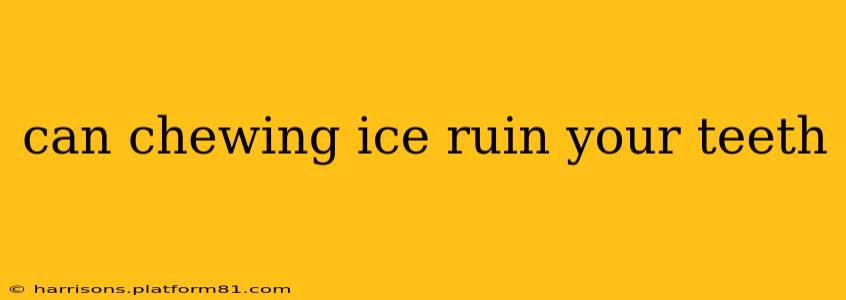Chewing ice may seem harmless, but the truth is it can significantly damage your teeth. While the occasional ice cube might not cause immediate problems, the habit of regularly crunching on ice can lead to a range of dental issues. This article delves into the potential consequences of chewing ice, offering insights and advice to protect your pearly whites.
What Happens When You Chew Ice?
The hardness of ice puts immense pressure on your tooth enamel, the protective outer layer. This pressure can cause:
- Cracks and Chips: The most common consequence is the fracturing of tooth enamel, leading to small cracks or chips that can become increasingly noticeable and painful over time. These imperfections provide entry points for bacteria, increasing the risk of cavities and infections.
- Weakened Enamel: Repeated exposure to the abrasive force of ice gradually weakens the enamel, making your teeth more susceptible to damage from other sources, such as acidic foods and drinks. Thinned enamel also exposes the underlying dentin, making your teeth more sensitive to temperature changes and sweets.
- Broken Teeth: In severe cases, chewing ice can lead to the complete fracturing or breakage of a tooth. This requires costly and extensive dental repair or even extraction.
How Can I Tell if Chewing Ice is Damaging My Teeth?
Recognizing the early signs of ice-induced tooth damage is crucial for preventing more serious problems. Keep an eye out for:
- Increased Tooth Sensitivity: Experiencing sharp pain when consuming hot or cold foods and drinks is a common indicator of enamel erosion.
- Visible Cracks or Chips: Carefully examine your teeth in a mirror for any chips, cracks, or discoloration.
- Discomfort While Chewing: If you feel pain or discomfort while chewing, it's a warning sign that something may be wrong.
Is it okay to chew ice occasionally?
The occasional ice cube likely won't cause significant harm, but it’s best to avoid it as a regular habit. Moderation is key. If you find yourself constantly craving the icy crunch, explore healthier alternatives.
What are some alternatives to chewing ice?
If you enjoy the sensation of chewing something cold and crunchy, try these healthy alternatives:
- Frozen Grapes or Berries: These offer a refreshing and flavorful alternative that's much gentler on your teeth.
- Sugar-Free Ice Pops: Opt for ice pops without added sugars to minimize the risk of cavities.
- Celery Sticks: Provide a satisfying crunch without the risk of damaging your teeth.
Can chewing ice cause other dental problems?
Beyond direct damage to enamel, the habit can exacerbate existing dental conditions:
- Temporomandibular Joint (TMJ) Disorders: The forceful chewing action can strain the jaw muscles and joints, potentially leading to TMJ disorders characterized by pain, clicking, and limited jaw movement.
- Increased Risk of Cavities: Cracks and chips in the enamel created by chewing ice provide easy access for bacteria, increasing the risk of developing cavities.
How can I prevent damage from chewing ice?
The best way to protect your teeth is to simply avoid chewing ice. If you find it difficult to break the habit, consider these strategies:
- Mindfulness: Pay attention to your chewing habits and consciously avoid reaching for ice cubes.
- Alternative Satisfiers: Keep healthy, crunchy alternatives on hand to satisfy the urge for a cold, crunchy treat.
- Professional Help: If you struggle to quit chewing ice, a dentist or therapist may be able to help you develop strategies to overcome the habit.
This information is for general knowledge and does not constitute medical advice. Always consult with your dentist if you have concerns about your dental health. Regular dental checkups are vital for maintaining good oral hygiene and detecting potential issues early on.
